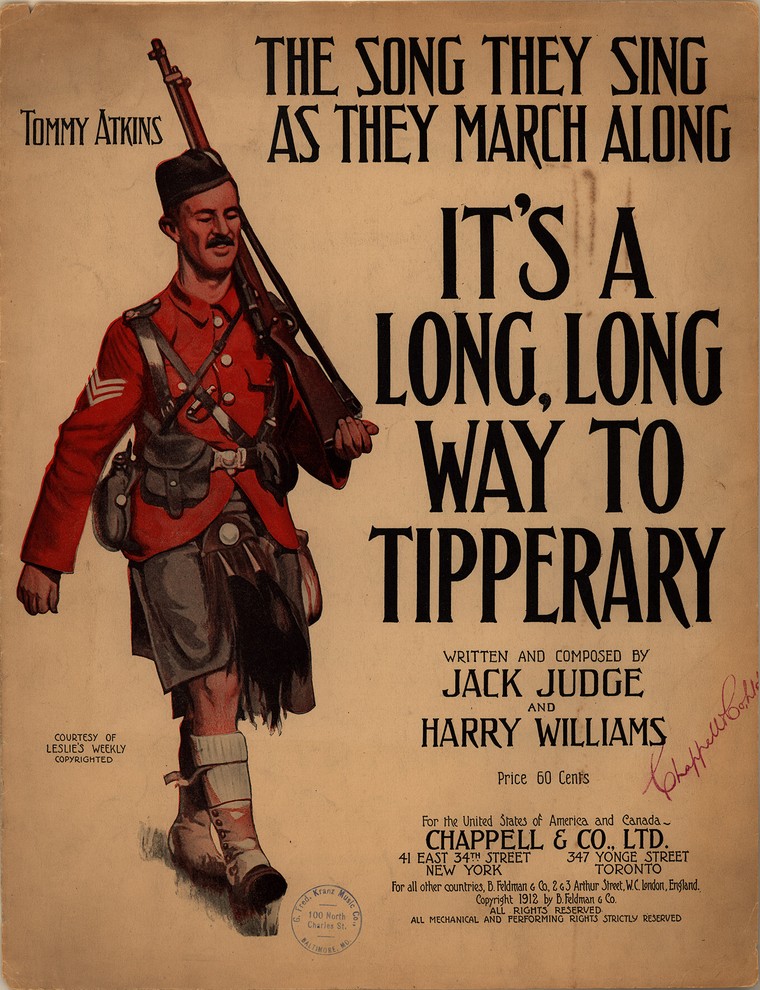Its a long way to Tipperary
| AKA | Tipperary |
| First Published | 1912 |
| Writer/composer | Jack Judge and Harry Williams | Roud | RN37122 |
| Music Hall Performers | Florrie Forde, Jack Judge, Maude Mortimer |
| Folk performances | Collected from the singing of: McCullough, Dorothy; Canada: Ontario; 1981 |
Up to mighty London Came an Irishman one day. As the streets are paved with gold Sure, everyone was gay, Singing songs of Piccadilly, Strand and Leicester Square, Till Paddy got excited, Then he shouted to them there: It's a long way to Tipperary, It's a long way to go. It's a long way to Tipperary To the sweetest girl I know! Goodbye, Piccadilly, Farewell, Leicester Square! It's a long, long way to Tipperary, But my heart's right there… Paddy wrote a letter To his Irish Molly-O, Saying, "Should you not receive it, Write and let me know!" "If I make mistakes in spelling, Molly, dear," said he, "Remember, it's the pen that's bad, Don't lay the blame on me! Molly wrote a neat reply To Irish Paddy-O, Saying "Mike Maloney Wants to marry me, and so Leave the Strand and Piccadilly Or you'll be to blame, For love has fairly drove me silly: Hoping you're the same!"
A song so well-known and so widespread that it has been largely ignored by even modern folksong collectors…

A famous song of the First World War, in fact written two years before the war started. It originally it referred to the homesickness of an Irish emigrant, rather than that of a soldier. It’s precise origins are disputed. The best account that I have found is in Richard Baker’s book – the following is an abbreviated version of his account.
In 1912 Jack Judge was appearing at a music hall in Stalybridge, Greater Manchester and at the end of the evening accepted a bet that he could write a song before the next day was over. On the way back to his lodgings he half heard someone else’s conversation which seem to include the line “It’s a long way to…”. Next morning he sat down and wrote the words of the song, taking the tune to the Stalybridge bandleader who arranged his music for the band to play that night. That’s one version of the story …
The other version is that Judge was in fact rewriting an earlier song that he had penned together with his then friend Harry Williams (possibly one called It’s a long way to Connemara). Both Judge and Williams were officially credited on the sheet music. The song was not an immediate hit – it took off when the troops started singing it as a marching song. The song was so successful that the publishers promised to pay the writers £5 a week ….. Whether the song was written by Judge alone, or the pair of them remains a subject of dispute.
A contemporary recording by Albert Farringdon:
Sources:
- Entries in the Roud Indexes at the Vaughn Williams Memorial Library: https://archives.vwml.org/search/all:single[folksong-broadside-books]/0_50/all/score_desc/extended-roudNo_tr%3A37122
- Kilgarrif Sing Us
- Lyrics and Sheet Music: Greer Music Library at Connecticut College
- Richard Baker: British Music Hall